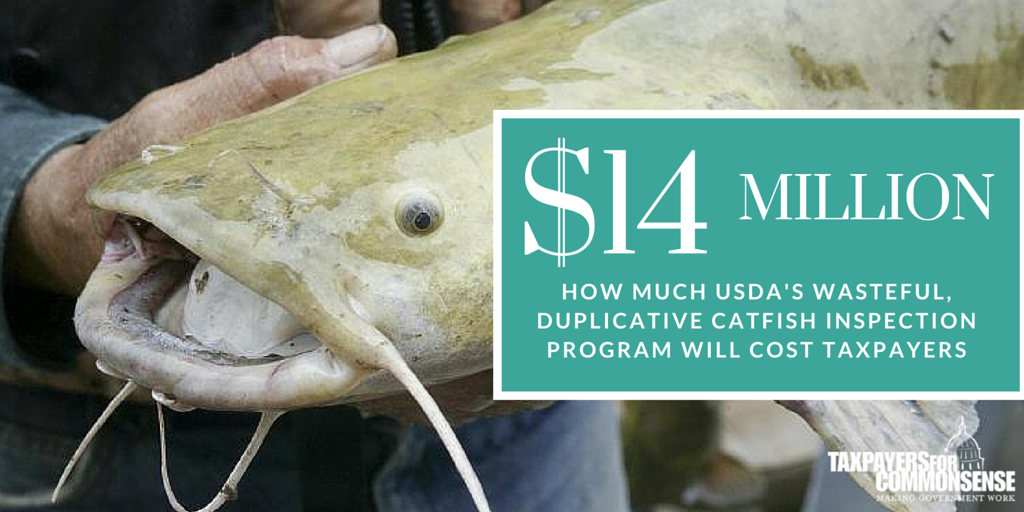While presidential hopefuls trolled for votes and traded barbs, a rare act of bipartisanship recently surfaced in the Senate. Twenty seven Democrats and twenty seven Republicans, along with Maine Independent Angus King, cast their vote to end one of Washington’s most blatantly wasteful programs. Now taxpayers can land millions in savings if House leadership allows a debate on ending the catfish inspection program run by the United States Department of Agriculture.
Current law provides that the Food and Drug Administration is responsible for conducting safety inspections for all fresh and saltwater seafood–from Abalone to Zander—except, that is, for catfish inspections. Under the 2008 farm bill, catfish inspections became the responsibility of the Department of Agriculture. No special safety concern prompted this shift, at least according to the testimony of the president of the National Fisheries Institute. Furthermore, there’s no economic or governmental efficiency reasoning for the shift, at least if you believe the nearly dozen reports from the Government Accountability Office. Yet, unless the House is given the opportunity to follow the Senate’s lead, taxpayers will soon be paying $14 million annually to implement the USDA’s catfish inspection program.

At its core, the fight over regulating catfish centers on protecting a domestic industry from foreign competition. In 2002, Senator Thad Cochran (R-MS) shepherded through a regulation banning foreign producers from labeling their fish as “catfish,” which is why you see basa and swai in the grocery store. This restriction failed to stem the tide of imported catfish-cousins. Since 2004 the amount of catfish shipped to the U.S. has soared from 7 million pounds to 215 million pounds in 2014. Senator Cochran helped insert a provision into the 2008 farm bill shifting inspection responsibility to the USDA. With the USDA in charge, all foreign producers would need to reorient their packaging and procedures to what would likely be a drastically different inspection regime. Finally, after seven years and $20 million studying development of the program, USDA is set to put the finishing touches on its regulations. By the way, in 2015 Mississippi produced 55 percent of U.S. domestic catfish.
There’s absolutely no reason taxpayers should be faced with this bill. Congress has already clearly indicated it would like to end the duplicative catfish inspection program.
In 2012 when the Senate first debated a new farm bill, an amendment to eliminate the USDA catfish inspection office was so noncontroversial it was accepted by voice vote. When the House released its version of the farm bill in 2013, members didn’t even need to vote. The House Agriculture Committee itself, not normally inclined to reject parochial programs, eliminated the USDA catfish inspection office as part of the base bill. Even President Barack Obama’s fiscal year 2014 budget request sought (submitted in 2013) to keep the USDA out of the program.
So, when the president, the House Committee on Agriculture, and the entire U.S. Senate have hooked onto a good idea, surely taxpayers can reap the savings. Not in this swamp.
You’d think the new Senate (fresh after the 2012 elections) would start up where they left off the previous year – no USDA catfish inspection office in the farm bill. Instead, the amendment to eliminate the office was the only one of 73 previously successful amendments that was stripped from the bill upon reintroduction. What changed? Well the newly minted ranking member on the Agriculture Committee was none other than Senator Cochran of Mississippi. Adding insult to injury, Senators seeking to gut the office were not even allowed a vote on their amendment. Taxpayers were forced to swallow the office hook, line, and sinker.
Taxpayers can’t afford for lawmakers to continue pushing costly, duplicative parochial programs at the expense of both the expressed will of Congress and the national interest. By passing S.J. Res 28, senators went on record calling for the elimination of the Department of Agriculture’s catfish inspection office. Now, it’s up to leadership in the House of Representatives to bring the bill to a vote and finally reel in significant savings.










